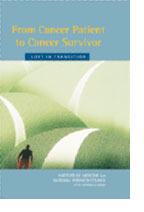
After Treatment: The Needs of Cancer Survivors
A new report by the Institute of Medicine (IOM) concludes that a growing number of cancer patients are surviving the disease only to face a constellation of new needs and that too often these needs are not met. The 500-page report, based on an extensive review of the scientific literature and interviews with survivors, proposes recommendations for improving the care and quality of life for these individuals.
 A primary recommendation is that all cancer patients be given summaries of their medical treatments and instructions for follow-up care once they complete therapy. These survivor care plans would document which treatments a patient had and which health changes should be monitored closely. A primary recommendation is that all cancer patients be given summaries of their medical treatments and instructions for follow-up care once they complete therapy. These survivor care plans would document which treatments a patient had and which health changes should be monitored closely.
"A care plan is a concrete step that could be taken tomorrow and would provide relief essentially immediately," says Dr. Sheldon Greenfield, who directs the Center for Health Policy Research at the University of California, Irvine, and co-led the panel that produced the report, From Cancer Patient to Cancer Survivor: Lost in Transition.
The study focuses on adult survivors from the time they complete initial treatment to a relapse, secondary illness, or death. During this period, survivors may develop any number of problems related to their cancers that prevents them from obtaining adequate health care, often with disastrous results.
The report stresses the need for more communication and coordination among doctors who treat the diverse health problems described in the report, including depression, sexual dysfunction, and heart disease.
The report also calls for the development of clinical care guidelines for every type of cancer, which would allow primary care physicians and other health professionals to help monitor and care for survivors.
"When you consider that there are 10 million cancer survivors in this country, finding these patients and delivering the best possible health care that is targeted to their special needs becomes a large concern for the health care community," says Dr. Sandra Horning, president of the American Society of Clinical Oncology (ASCO).
"I don't believe the issues of cancer survivorship have ever been laid out as clearly and comprehensively as in this report," adds Dr. Horning. ASCO is hosting a conference today to discuss the report and plan strategies for implementing the recommendations.
The study follows a report on survivors by the President's Cancer Panel last year, which proposed survivor care plans, and a 2003 IOM study on childhood cancer survivors.
All cancer survivors, the report concludes, have permanent health conditions
that may need to be treated like other chronic conditions. But it is not uncommon for friends and relatives of survivors to suggest that normal life should resume once the treatments have ended.
"This idea that a person completes cancer treatment and then returns to normal life as though nothing had happened is outrageous," says one of the report's editors Ellen Stovall, who is president of the National Coalition for Cancer Survivorship and
one of several survivors on the panel.
The panel emphasized the importance of more research to develop
evidence-based survivorship interventions for meeting the unique needs of cancer survivors.
"More people today are living with cancer than dying from it, and we must look critically at issues of quality of life and care for these survivors," says Dr. Julia Rowland, director of NCI's Office of Cancer Survivorship. "This report is a powerful blueprint for action."
By Edward R. Winstead
|